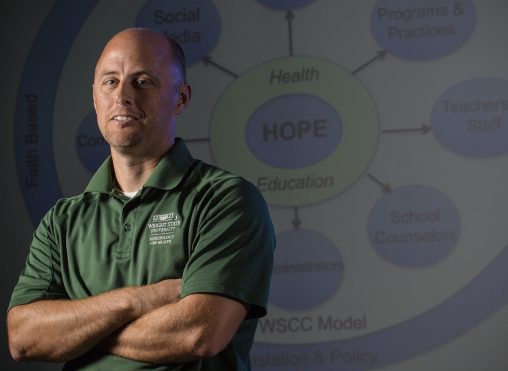
Kevin Lorson, professor and director of the Physical Education Licensure Program, is working on health education standards and drug and opioid abuse prevention education in Ohio public schools. (Photo by Erin Pence)
A Wright State University professor is leading efforts to improve health education and physical education in Ohio.
Ohio is currently the only state that does not have specific health education content standards for kindergarten through 12th grade. Ohio law requires schools to teach specific health education topics, including abuse of drugs, alcoholic beverages and tobacco, personal safety and assault prevention, sexual abuse prevention and first aid. Ohio recently added prescription opioid abuse prevention.
Kevin Lorson, professor and director of the Physical Education Licensure Program in Wright State’s College of Education and Human Services, says the current legislation standards are vague and do not provide guidance for what students will learn in each topic.
“Of the topics that Ohio has told schools to teach, there is no proof that schools actually teach or give much time to these topics,” said Lorson. “We not only don’t know if they teach these topics, but there is no guarantee what is taught is effective. It’s not really the schools’ fault as the state has provided little support for schools in health education.”
The only time requirement for health education in Ohio is for students to receive 60 hours of health education.
“You would think we would do more,” he said. “But the school day isn’t going to get any longer, so we’re not asking for more time but clarifying what students should be learning in health education to maximize our resources.”
Lorson serves as president of the Ohio Association of Health, Physical Education, Recreation and Dance and helped implement state physical education academic content standards in 2009.
Lorson and the association are working on three initiatives to improve health education in Ohio: health education standards, drug abuse prevention education and creating an opioid abuse prevention education curriculum.
He is working with the association to advocate for legislation that would authorize the Ohio Board of Education to adopt health education standards and allow the Ohio Department of Education to hire a health education consultant to oversee health education across the state.
Lorson said the lack of specific health content standards makes it difficult for educators to teach health education that will have a lasting impression on students when they leave school.
“We struggle a bit with a shared understanding about what is important for our students to learn in health education,” he said. “Health education is not just about facts and knowing information about health. … Schools and students are struggling a great deal to take that basic knowledge that’s being taught now into translating that into a healthier lifestyle.”
Lorson found that without specific health education standards there is an inconsistent learning focus to ensure students are making healthy decisions.
“It’s difficult to send out our students to teach in schools and teach these learning outcomes everyone else in the country is reaching, when there’s no state standards for us,” he said. “It creates a lack of consistency between the stakeholders who help Ohio’s students be healthy. Without standards and clear student learning focus, it’s difficult to be effective.”
Lorson is also a member of the Ohio Joint Study Committee on Drug Abuse Prevention Education with Ohio Attorney General Mike DeWine. The committee is responsible for developing recommendations in policy, legislation and programs to prevent drug abuse by students. The committee’s findings and recommendations should be available in December.
He received a grant from the Ohio Department of Higher Education to organize a statewide team of health educators, administrators and higher education faculty to develop a health and opioid abuse prevention education (HOPE) curriculum to help schools address state requirements. The team is creating curriculum that is adaptable to the needs of each school district in Ohio. The HOPE curriculum is expected to be ready for a test run in Ohio schools in fall 2017.
Mary Huber, an associate professor in Wright State’s Department of Human Services who sits on the grant team, and Judy Jagger-Mescher, director of the Health Education Licensure Program, assist Lorson with these initiatives.
Lorson hopes the new standards will improve the quality of health throughout the state of Ohio and help students leave high school as healthy individuals.

 Wright State student-athletes make a lasting impact on local family, more to come
Wright State student-athletes make a lasting impact on local family, more to come  Wright State names Rajneesh Suri dean of Raj Soin College of Business
Wright State names Rajneesh Suri dean of Raj Soin College of Business  ‘Only in New York,’ born at Wright State
‘Only in New York,’ born at Wright State  Wright State president, Horizon League leaders welcome new commissioner
Wright State president, Horizon League leaders welcome new commissioner  Wright State celebrates homecoming with week-long block party
Wright State celebrates homecoming with week-long block party 